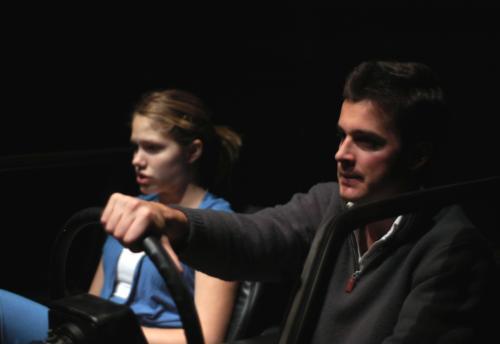
News
Garber Privately Tells Faculty That Harvard Must Rethink Messaging After GOP Victory

News
Cambridge Assistant City Manager to Lead Harvard’s Campus Planning

News
Despite Defunding Threats, Harvard President Praises Former Student Tapped by Trump to Lead NIH

News
Person Found Dead in Allston Apartment After Hours-Long Barricade

News
‘I Am Really Sorry’: Khurana Apologizes for International Student Winter Housing Denials
Driving Towards Tragedy on HRDC’s ‘Autobahn’

Harvard students may not spend a lot of time in cars around campus, but the upcoming production of Neil LaBute’s play “Autobahn” in the Loeb Experimental Theatre promises to thrust them into the midst of the visceral interactions of daily commutes in Chevrolets, Mercedes, and old Pintos.
Contemporary playwright, film director, and screenwriter LaBute is well known for his stark portrayals of human relationships, and “Autobahn”—which runs Dec. 8-10 and 13-16—is no exception.
Though the interactions between LaBute’s characters are almost always intense, the unique setup of “Autobahn” increases this intensity. Throughout five 20-minute scenes, the actors never leave the front seat of a car.
“Autobahn” delves into how romantic relationships between men and women—and, in one case, two women—unfold when couples are forced to remain in such a confined space. Five actors play ten different characters facing crucial points in their lives: for example, a young couple on the verge of breakup and a man hoping for his wife’s fidelity.
According to students involved with “Autobahn,” the play’s sense of intimacy approaches that of a film or even a novel. In fact, it’s this sense of closeness that drew director Adam G. Zalisk ’07 to the script. His past three productions were much more canonical: Sophocles’ “Antigone,” Chekhov’s “The Seagull” and Shakespeare’s “Richard II.”
“Having a 20-minute scene really allows a kind of depth of...character work that I hadn’t gotten to do in such a sustained way before,” Zalisk says.
Depth and richness in LaBute’s work effects both comedic and tragic reactions for the audience, not only from scene to scene but from minute to minute, according to Zalisk.
“[Autobahn] integrates, in a way that’s very powerful, moments of great malice, moments of great humor, and moments of tenderness,” says Zalisk.
Co-producer and stage manager Veronica T. Golin ’07 adds that the set, which consists of a reproduction of a car’s front half, emphasizes the play’s focus on human relationships. The sparseness of the set augments reality: every facial twitch is front and center and every finger movement a possible revelation.
Production staff have also significantly reduced theater space in the Ex so the audience will be closer to the action physically as well as emotionally.
“The majority of the experience is about watching the actors act. Sometimes theater can get lost in creating huge effects. This is sort of bringing it down to a simpler level again,” Golin says.
Simple as it may be, co-producer Stephen T. Volpe ’07 believes the script’s universality will appeal to Harvard students.
“The majority of people in our generation grew up in cars, whether it’s getting in fights, making out with someone, or going to IHOP late at night with a bunch of people,” he says.
In a departure from LaBute’s original script, the actors have improvised and videotaped monologues for each of their characters. The recordings will be shown before, during, and after the production.
According to Zalisk, adding a second filmic dimension to a three-dimensional work further develops the personalities onstage with confessional, personal statements.
“We’re all so used to watching TV,” he explains. “Using video reminds [the audience] why people watch live actors.”
The cast and crew, many of whom have worked with one another on previous productions, say they feel a strong bond not only with each other, but also to the production itself.
Asked what his favorite scene was, Volpe replies, “they’re like our children: we can’t choose!”
Actress Sophie C. Kargman ’08, who plays a lesbian’s estranged partner and a well-meaning if desperate housewife, said she enjoyed the chance to delve into the psychology of a character in a cinematic way.
“It’s the closest thing to film that I’ve ever done.”
Want to keep up with breaking news? Subscribe to our email newsletter.
